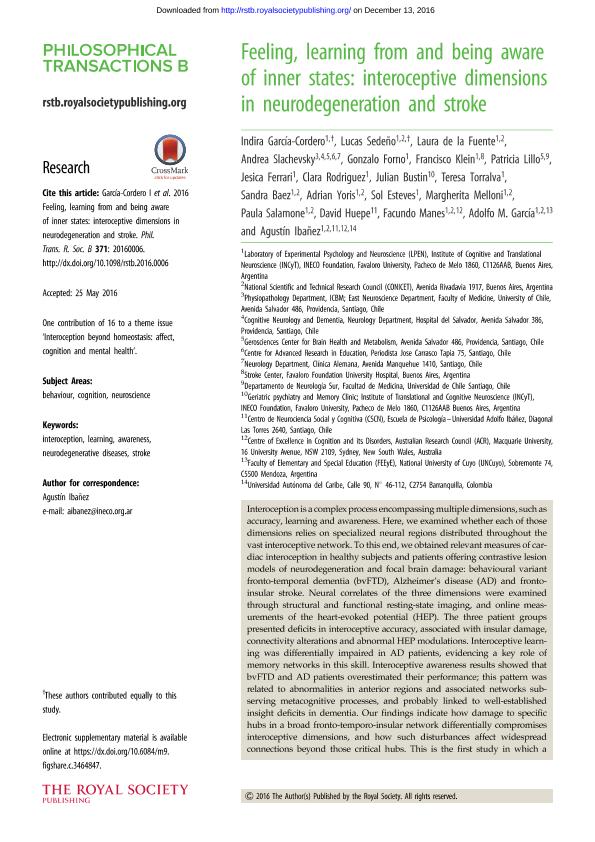Artículo
Feeling, learning from and being aware of inner states: Interoceptive dimensions in neurodegeneration and stroke
García Cordero, Indira Ruth ; Sedeño, Lucas
; Sedeño, Lucas ; de la Fuente de la Torre, Laura Alethia
; de la Fuente de la Torre, Laura Alethia ; Slachevsky, Andrea; Forno, Gonzalo; Klein, Francisco; Lillo, Patricia; Ferrari, Jesica Celeste; Rodriguez, Clara; Bustin, Julian; Torralva, Teresa; Báez Buitrago, Sandra Jimena
; Slachevsky, Andrea; Forno, Gonzalo; Klein, Francisco; Lillo, Patricia; Ferrari, Jesica Celeste; Rodriguez, Clara; Bustin, Julian; Torralva, Teresa; Báez Buitrago, Sandra Jimena ; Yoris Magnago, Adrián Ezequiel
; Yoris Magnago, Adrián Ezequiel ; Esteves, Sol; Melloni, Margherita
; Esteves, Sol; Melloni, Margherita ; Salamone, Paula Celeste
; Salamone, Paula Celeste ; Huepe, David; Manes, Facundo Francisco
; Huepe, David; Manes, Facundo Francisco ; García, Adolfo Martín
; García, Adolfo Martín ; Ibañez, Agustin Mariano
; Ibañez, Agustin Mariano
 ; Sedeño, Lucas
; Sedeño, Lucas ; de la Fuente de la Torre, Laura Alethia
; de la Fuente de la Torre, Laura Alethia ; Slachevsky, Andrea; Forno, Gonzalo; Klein, Francisco; Lillo, Patricia; Ferrari, Jesica Celeste; Rodriguez, Clara; Bustin, Julian; Torralva, Teresa; Báez Buitrago, Sandra Jimena
; Slachevsky, Andrea; Forno, Gonzalo; Klein, Francisco; Lillo, Patricia; Ferrari, Jesica Celeste; Rodriguez, Clara; Bustin, Julian; Torralva, Teresa; Báez Buitrago, Sandra Jimena ; Yoris Magnago, Adrián Ezequiel
; Yoris Magnago, Adrián Ezequiel ; Esteves, Sol; Melloni, Margherita
; Esteves, Sol; Melloni, Margherita ; Salamone, Paula Celeste
; Salamone, Paula Celeste ; Huepe, David; Manes, Facundo Francisco
; Huepe, David; Manes, Facundo Francisco ; García, Adolfo Martín
; García, Adolfo Martín ; Ibañez, Agustin Mariano
; Ibañez, Agustin Mariano
Fecha de publicación:
11/2016
Editorial:
The Royal Society
Revista:
Philosophical Transactions of the Royal Society B: Biological Sciences
ISSN:
0962-8436
Idioma:
Inglés
Tipo de recurso:
Artículo publicado
Clasificación temática:
Resumen
Interoception is acomplex process encompassing multiple dimensions, such as accuracy, learning and awareness. Here, we examined whether each of those dimensions relies on specialized neural regions distributed throughout the vast interoceptive network. To this end, we obtained relevant measures of cardiac interoception in healthy subjects and patients offering contrastive lesion models of neurodegeneration and focal brain damage: behavioural variant fronto-temporal dementia (bvFTD), Alzheimer’s disease (AD) and frontoinsular stroke. Neural correlates of the three dimensions were examined through structural and functional resting-state imaging, and online measurements of the heart-evoked potential (HEP). The three patient groups presented deficits in interoceptive accuracy, associated with insular damage, connectivity alterations and abnormal HEP modulations. Interoceptive learning was differentially impaired in AD patients, evidencing a key role of memory networks in this skill. Interoceptive awareness results showed that bvFTD and AD patients overestimated their performance; this pattern was related to abnormalities in anterior regions and associated networks subserving metacognitive processes, and probably linked to well-established insight deficits in dementia. Our findings indicate how damage to specific hubs in a broad fronto-temporo-insular network differentially compromises interoceptive dimensions, and how such disturbances affect widespread connections beyond those critical hubs. This is the first study in which a multiple lesion model reveals fine-grained alterations of body sensing, offering new theoretical insights into neuroanatomical foundations of interoceptive dimensions. This article is part of the themed issue ‘Interoception beyond homeostasis: affect, cognition and mental health’.
Palabras clave:
Awareness
,
Interoception
,
Learning
,
Neurodegenerative Diseases
,
Stroke
Archivos asociados
Licencia
Identificadores
Colecciones
Articulos(OCA HOUSSAY)
Articulos de OFICINA DE COORDINACION ADMINISTRATIVA HOUSSAY
Articulos de OFICINA DE COORDINACION ADMINISTRATIVA HOUSSAY
Articulos(SEDE CENTRAL)
Articulos de SEDE CENTRAL
Articulos de SEDE CENTRAL
Citación
García Cordero, Indira Ruth; Sedeño, Lucas; de la Fuente de la Torre, Laura Alethia; Slachevsky, Andrea; Forno, Gonzalo; et al.; Feeling, learning from and being aware of inner states: Interoceptive dimensions in neurodegeneration and stroke; The Royal Society; Philosophical Transactions of the Royal Society B: Biological Sciences; 371; 1708; 11-2016
Compartir
Altmétricas



